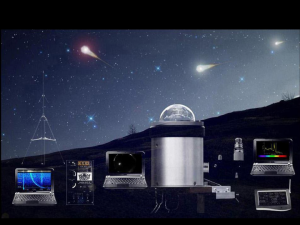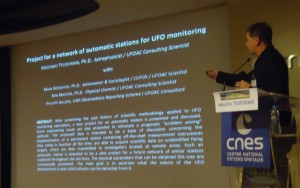For the past couple of years, a small team of scientists and professionals (including myself), has been planning an innovative approach to the scientific study of UFOs.
Our goal is simple: to build a network of automated stations with a variety of scientific instruments to capture comprehensive, scientifically valid data on the UFO phenomenon. We have named the organization UFO Detection and TrAcking (UFODATA for short), and several members of our team are well known to the UFO community as pioneers in the study of UFOs in the field, including Erling Strand, Massimo Teodorani, and David Akers. The project was conceived by and is led by Mark Rodeghier, scientific director of the Center for UFO Studies, and Alexander Wendt, a political scientist at Ohio State University.
Our website (www.ufodata.net) contains details on the technology we plan to use in our stations, a listing of team members (including silent advisors who because of their position do not wish to be identified), an FAQ answering many common questions we anticipate about our plans, and an extensive set of resources on the scientific study of UFOs and what we currently know about the phenomenon.
It has become clear that any breakthrough in our understanding of the UFO phenomenon will require a break from the past. Witness testimony, photos and videos, and government documents have taken us only so far; instead, we need to record and study UFOs directly, as other sciences do with their own specific objects. Of course, this is a daunting task, but it is made conceivable by advances in technology, software, communication capabilities, and power sources.
Even though all of us are volunteers, the cost of hardware, programming, and infrastructure for the stations will be substantial. And that is where we plan to use another recent social innovation—crowdfunding—which has been used successfully for many types of projects, from commercial to scientific. UFODATA is incorporated as a non-profit, 501 (c)(3) organization to allow for fundraising, which we will do in at least two stages.
We are now beginning Phase One of the project with the launch of the UFODATA website and outreach efforts, including communications like this. We hope to raise sufficient funds in this phase via direct donation (www.ufodata.net/donate.html) to build a prototype station and develop necessary software and testing routines. We also, importantly, will be looking for technically-qualified volunteers in several areas, listed on the Volunteer page on the website.
We believe that the current scientific, technical, and social environment is primed to support such an endeavor as UFODATA. We expect to build on the best work of the past and do what the scientific community as a whole has failed to do: take UFOs seriously and study them rigorously.
If you would like to contact us directly for additional information, you can email the team at admin@ufodata.net and we’ll respond to your note as soon as possible.

